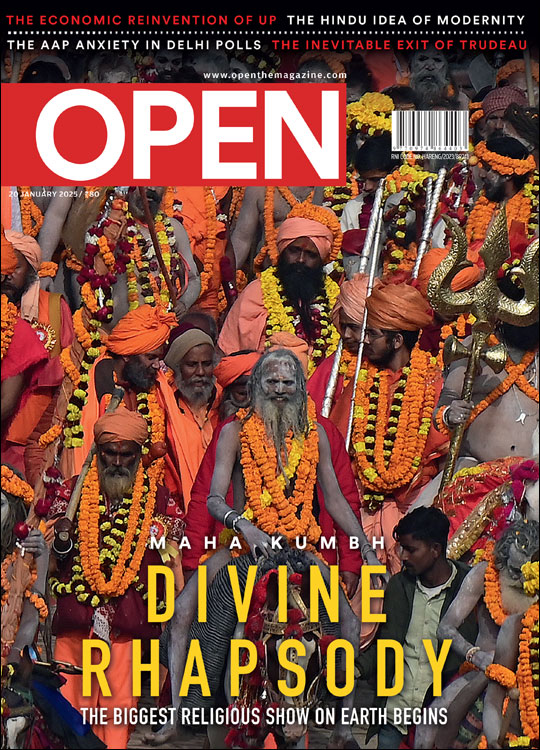Syrian Refugees: Exodus and the Idea of Home
The German question is not about the number of refugees it can take. Zaher’s story says it all
 Bennett Voyles
Bennett Voyles
 Bennett Voyles
Bennett Voyles
 |
31 Mar, 2016
|
31 Mar, 2016
/wp-content/uploads/2016/03/Exodus1.jpg)
WE WERE SUPPOSED to meet under the World Time Clock at Alexanderplatz at 4:30, but Zaher is now ten minutes late. He has just texted to let me know, but he didn’t need to —I knew he would be. He has a lot of nice qualities, but promptness isn’t one of them: when we took German together last year, he always showed up ten minutes late.
It’s tempting to make a joke about his not having turned Prussian yet, but all that stuff about German precision is mostly a myth, at least here. Berlin is Rome-on-the-Spree.
I’d asked to get together because I’m working on a piece about the integration of Syrian refugees into German life, and I wanted to find out how he’d gotten on. It’s an important question, and not just for Zaher personally. Last year, most Germans were cautiously optimistic about immigration. But now, after the country has taken in more than a million refugees, and particularly after the publicity around mass attacks on 90 German women in Cologne on New Year’s Eve by a number of unidentified North African and Arab men, the sentiment has changed.
I’d started to wonder myself that New Year’s Eve. It’s a raucous holiday in Berlin too, filled with so many firecrackers the streets feel like a war zone. When I walked my youngest daughter to the S-Bahn station that evening to go meet her friends, we passed a gauntlet of 20 boys and young men—Turks, I think, but I don’t know—who stood gawking at a glass bus shelter that was now mostly a steel frame. Somebody had shattered it on all three sides with strategically placed firecrackers.
This kind of thing has made many German voters very nervous. The popularity of Chancellor Angela Merkel, once so popular they called her ‘Mutti’, or ‘Mommy’, has slid from 75 to 46 per cent over the past year, a record low. Newspaper editorials question whether Muslims can be integrated into the society as a whole. And in February, a new far right party, Alternative for Germany (AfD), won seats in three regional parliaments, and polls nationally now in the low double digits.
It’s raining now. The area near the giant drum-shaped clock, a Communist relic with 24 time zones topped by what looks like a kind of stainless steel model of an atom, may not be the best place to think about the future. Aside from the iconic and now outmoded1969 TV tower, Alexanderplatz today is home to some dreary shopping malls and fast food stands. These 90s buildings replaced drab parliamentary buildings built in the 60s by the German Democratic Republic. Those, in turn, filled the craters left by Allied bombs in the Forties that helped cut the Thousand Year Reich short by 988 years. Fascism to fast food in seven decades may be progress, but a bulldozing every 25 years doesn’t inspire a lot of confidence in humanity’s collective ability to plan.
Zaher’s arrival jolts me out of my gloom. He looks better—more rested and less drawn—than when I’d seen him last. He’s dressed casually but carefully, like architects everywhere. We go to a cafe he knows on the other side of the train overpass and find a seat near the window. The waiter, a young and slightly snooty Indian, condescends to take our order—I order an Apfelchorle, and after some deliberation he orders some kind of mocktail called a Strawberry Cup—and I ask Zaher how it’s going.
He has good news—first, he has a job. For the past five months, he’s been working for one of Germany’s biggest architectural firms, on a team designing a stadium for the 2022 World Cup in Qatar. His commute is long, but he’s hoping to find a place nearer his office soon. He’s also made six Syrian friends, including two teachers, and another architect—and they get together every week or two. If it weren’t for an air of melancholy, the 32-year-old would sound like any other young professional here.
But he’s still frustrated. He had more flexibility when he worked for himself, back in Aleppo. He also misses his family, who moved to Turkey in 2012. They speak almost every day, but because Turkey now requires Syrians to have a visa to visit, it is hard for him to visit them. They live in Gaziantep, a city of 1.5 million that’s just a three-hour drive from Aleppo, their hometown; in the old days, they would drive over for the day, sometimes just to shop. “My brother, he’s in IT engineering, he’s working there, and I have another brother, he’s studying to be a dentist now. I also have a sister, she’s 12 years old, at school too.”
I can’t vouch for the overall demography of the refugees, but I don’t think Zaher’s story is atypical. In Berlin, anyway, a lot of the Syrians don’t look like unskilled labour. The men I have trouble spotting, simply because they blend in so well; I remember thinking when Zaher first walked into class last year—a tall guy with a neatly trimmed beard, glasses, and a pullover sweater—that he was probably Spanish. The women tend to stand out more, not so much because of their headscarves, as a lot of Turkish women wear head scarves, but because although they dress conservatively they also tend to wear their coats wrapped more tightly than the typical Berlinerin. They tend to be more delicate too, almost bird-like, and have that sheen of prosperity you see more often in Paris or London than in relatively poor Berlin.
The popularity of Chancellor Angela Merkel, once so popular they called her ‘Mutti’, or ‘Mommy’, has slid from 75 to
46 per cent over the past year
This is something of an accomplishment, because it takes a lot to stand out in Berlin. At the moment, the city is a sort of real life version of Casablanca (the World War II movie city, that is), a kind of sanctuary that’s drawn people in from all kinds of places hoping to change their luck or at least stay out of harm’s way. In our German class, for instance, there were 22 students from 12 different countries, maybe nine from places where, for either political or economic reasons, a return ticket was probably not high on their list of priorities. However, if we had formed a parliament, the Syrians would have had the plurality.
DESPITE THEIR ADVANTAGES, settling in is not easy. “It’s not only starting over,” Zaher says. “When you come here, you have to study a language, so you start, not from zero, you start from minus, really. To get to zero, you should be like normal Germans, but you don’t know the language, you don’t know anything about the culture here, so you are minus. It’s very hard.”
He’s right about that: working your way up from minus isn’t a picnic. We’d suffered through the same classes at the Hartnackschule, a cheap and crowded for-profit grammar factory that teaches three-hour German classes morning, noon and night, 50 weeks a year, and I’m not sure many of us really managed it.
But the four or five Syrians in our classes had all seemed to me to be up to the challenge. They already spoke good English, the lingua franca of young Europe, and they were generally quite sharp. Nor did they seem likely to cause the kind of trouble the tabloids and the AfD seemed to think we have in store: Ali, a young guy who wanted to become a plastic surgeon; a pretty young woman with long chestnut hair I’d thought might be Italian; Ahmad, an athletic vegetarian who wanted to become a physical therapist or a sports writer; an older lady without a headscarf who walked with a cane—she had three sons and a husband in Germany, all doctors, and Zaher.
Like most of the Syrians, Zaher didn’t like to talk poltics. I hate politics, he had told me when we first met. I don’t like talking about it. He had left Aleppo because there was nothing left there now—just rubble and people missing arms and legs, he had said making a chopping motion with his arm.
During one class break, I remember, he had showed me pictures on his phone of some of his commissions back home in Aleppo—the dark-wood interior of a fancy candy store, a white seaside villa that had a certain Arabic flair, filled with a white Mediterranean light; the before scene that dystopian sci-fi movies often include to remind the audience how lucky they are to live in a place that’s not entirely ashes and fear. As Ahmad told me once about life in his hometown, it was all just really normal. Just like here, he said.
For Zaher, things have worked out fine so far. Even the language hasn’t been a problem: his office is very international and operates mostly in English. But will it work out as well for other Syrians?
Zaher doesn’t think they will be much trouble. “For every nationality, there are good people and bad people, so for sure, from all of those Syrian people who came here, you will find bad people too, but only bad people appear in the media,” he says.
There may be more reasons to feel optimistic. These refugees aren’t starting out as far minus as earlier waves of foreigners. First, many are reportedly well-educated. Most professionals have left, Zaher says—there’s nothing for them to do at home.
The Government is also encouraging them to learn German, something that was actively discouraged when the first Turkish workers were brought to West Germany in the Sixties.
Could the far right create problems for them? After all, Germans haven’t always been nice neighbours, at home or abroad. The National Socialists killed millions of Jews, Roma, Sinti, Communists, homosexuals, schizophrenics; the deaf, blind, and mentally-challenged—and not in the heat of battle or hot-tempered communal rage, but as a deliberate policy.
On this score, however, there seems little cause for concern. The German Constitution begins with the injunction ‘human rights must be respected.’ Not German human rights, but human rights everywhere. It’s true that the last elections brought the AfD into provincial parliaments, but not into their governing coalitions. In polite society, extreme nationalism is still viewed more or less like a mental disorder.
Besides that, Germans today are a cosmopolitan bunch: 19.5 per cent have an immigrant background, including Turks, Poles, Italians and ethnic Germans who were ethnically cleansed out of Central and Eastern Europe after the War, or their descendants, and the 2.5 million ethnic Germans who left the former Soviet Union in the 1990s, according to a 2011 paper by Götz Nordbruch, an Islamic specialist at the Georg Eckert Institute, for International Textbook Research in Braunschweig.
Nor are Germans as interested in Germany as the French, say, are interested in France. It’s dark and wet much of the year, and Germans leave every chance they get. They spend $92 billion a year on travel. Only Americans and the Chinese spend more, and they have more people and larger economies.
Nor do they just to go to the beach: my current German teacher for example, has lived in four or five different countries and driven across the States two or three times. He’s even been to my homestate, Oregon, twice, which is twice more than most Americans.
Of course, it’s possible to stay racist and be a big traveller—think of the British Raj—but the attitude tends to become a little harder to maintain if you’ve been to other places. It is true that openness to immigration is fairly recent—official recognition of Germany as a country of immigrants happened only 15 years ago—but to some degree, Germany was always a more plural and often more tolerant society than advertised.
This was particularly true for Prussia, the political unit that eventually unified Germany in the 1870s. Although Prussia is now remembered as the mainspring of German hyper-nationalism, at one point in the 17th century, a quarter of the population of Berlin was French Protestants who had fled Catholic France. A century later, Frederick the Great, set up colonisation agencies all over Europe to attract artisans to Prussia. He was an anti-Semite like his friend Voltaire and most of Europe, but otherwise open on the subject of religion. “All religions are just as good as each other, as long as the people who practise them are honest, and even if Turks and heathens came and wanted to populate this country, then we would build mosques and temples for them,” he said.
The Germans were also late to the colonisation game, which arguably makes racism a more distant preoccupation. In the 19th century, after all the work involved in consolidating Germany, Chancellor Bismarck didn’t pursue overseas colonies, and Germany eventually ended up with only Tanzania and Namibia. As a result, the Germans have nothing like the hundreds of years of racism that France is trying to overcome with respect to Arab, North African, and sub-Saharan Africa, or the US with respect to the grim legacy of black slavery and the subjugation of Native America.
Even anti-Semitism, usually thought to be as German as sauerkraut, turns out to have been a relatively minor feature before Hitler. Before 1919, anti-Semitism was not a major preoccupation with Germans generally, according to Professor Margaret Anderson, a professor emeritus of history of the University of California at Berkeley. German universities opened to Jews long before British universities did, she notes, and both major political parties in the late 19th century fielded Jewish candidates. As she wrote to me:
‘I asked a friend of mine—also a professor of German history, who had just edited a book on anti-Semitism in Germany called Exclusionary Violence—how many Jews werekilled in Germany as a result of anti-Semitism between the end of the 1848-9 revolutions and 1914. He has a much more bleak view of the strength anti-Semitism in this period than I do; but he thought awhile, and could only come up with—one. (A fight in a bar, if I remember correctly.)’
As with the US, however, Germany’s tolerance toward minorities and foreigners has bounced up and down over time. In the end, the factor that may be most reliable is that there are solid economic reasons the German Government wants to make sure things work out for the refugees: Germany needs them.
TODAY, GERMANY HAS one of the lowest birth rates in the world, 8.2 per thousand. A recent study by the Bertelsmann Foundation estimates that the country needs to bring in about 500,000 immigrants every year between now and 2050 just to keep its labour numbers even. Without immigration, the percentage of working-age residents here in Europe’s biggest economy will fall from 61 to 54 per cent of the population within the next 15 years—a huge problem given the fact that unemployment is just 6.5 per cent now, and, as in most countries, it’s the current worker who supports the current retiree.
Even as the Right worries that refugees will ruin the country and the Left argues that the act of accepting them and helping them assimilate will be good for karma, no one on either side of the aisle seems to be considering a third possibility: what if peace breaks out? After all, when the wars in the Balkans ended in the 90s, many refugees in Germany headed home.
I ask Zaher if he would go back.
“No place like home,” he says, with a sad smile. “But I will try to feel as at home here.”
What does he miss?
“Everything, just everything: my family, my friends, my good friends, the culture… Here, you don’t see the family connection. In Syria, we are more friendly, people are more friendly.” And the food, he adds. He misses the food. “Food is an important thing actually,” he says.
In the end, the biggest risk Germany faces in its refugee crisis is not that it gets too many, but too few.

/wp-content/uploads/2025/01/Cover_Kumbh.jpg)













More Columns
The lament of a blue-suited social media platform Chindu Sreedharan
Pixxel launches India’s first private commercial satellite constellation V Shoba
What does the launch of a new political party with radical background mean for Punjab? Rahul Pandita